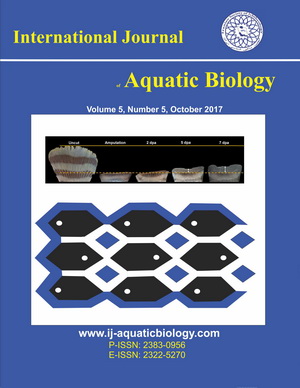Amelioration of cadmium-induced changes in biochemical parameters of the muscle of Common Carp (Cyprinus carpio) by Vitamin C and Chitosan
Downloads
The aim of this study was to investigate the effects of administering antioxidants, including vitamin C and chitosan on oxidative stress markers in muscle as edible tissues of Cyprinus carpio exposed to cadmium chloride. In this experiment, by exposing to 0.2 mg/L cadmium chloride for 21 days, fish were fed a normal diet, diet containing chitosan (1000 mg/kg diet), vitamin C (1000 mg/kg diet) or both vitamin C and chitosan. Oxidative stress markers, including the activity of catalase, total antioxidant and malondialdehyde (MDA) as well as biochemical parameters, including the activity of aspartate aminotransferase (AST), alanine aminotransferase (ALT), creatine phosphokinase (CPK), lactate dehydrogenase (LDH), and acetylcholinesterase (AChE) were measured. Fish exposure to cadmium chloride significantly increased AST, LDH, CPK, catalase, and MDA activity, while it significantly decreased AST and AChE activity, and levels of total antioxidant in muscle cells. Administration of chitosan or vitamin C alone or in combination with each other to fish exposed to cadmium chloride was effective in regulating ALT, CPK, and catalase activity. Although administration of vitamin C and chitosan caused a significant decrease in MDA, AST and LDH, these enzymes were still significantly higher than those in the control group. Administration of vitamin C and chitosan had no significant effects on the activity of AChE and levels of total antioxidant. Although, chitosan alone could not prevent oxidative stress damages in muscle tissues of cadmium-treated fish, administration of vitamin C combined with chitosan may increase the efficiency of antioxidant defense system and improve the detoxification system in the muscles of fish exposed to cadmium chloride.
Downloads
Agrawal P., Strijkers G.J., Nicolay K. (2010). Chitosan-based systems for molecular imaging. Advanced Drug Delivery Reviews, 62: 42-58.
Alishahi A., Mirvaghefi A., Tehrani M.R., Farahmand H., Koshio S., Dorkoosh F.A., Elsabee, M.Z. (2011a). Chitosan nanoparticle to carry vitamin C through the gastrointestinal tract and induce the non-specific immunity system of rainbow trout (Oncorhynchus mykiss). Carbohydrate Polymers, 86(1): 142-146.
Alishahi A., Mirvagheï¬ A., Tehrani M.R., Farahmand H., Shojaosadati S.A., Dorkoosh F.A., Elsabee M.Z. (2011b). Shelf life and delivery enhancement of vitamin C using chitosan nanoparticles. Food Chemistry, 126(3): 935-940.
Banaee M., Mohammadipour S., Madhani S. (2015a). Effects of sublethal concentrations of permethrin on bioaccumulation of cadmium in zebra cichlid (Cichlasoma nigrofasciatum). Toxicological and Environmental Chemistry, 97(2): 200-207.
Banaee, M., Sureda, A., Mirvagheï¬, A.R., Ahmadi, K. (2011). Effects of diazinon on biochemical parameters of blood in rainbow trout (Oncorhynchus mykiss). Pesticide Biochemistry and Physiology, 99: 1-6.
Banaee M., Sureda A., Shahaf S., Fazilat N. (2015b). Protective effects of silymarin extract on malthion-induced zebra cichlid (Cichlasoma nigrofasciatum) hepatotoxicity. Iranian Journal of Toxicology, 9(28): 1239-1246.
Benzie I.F., Strain J. (1996). The ferric reducing ability of plasma (FRAP) as a measure of "antioxidant power": the FRAP assay. Analytical Biochemistry, 239(1): 70-6.
Choi K.S., Yoo I.S., Shin K.O., Chung K.H. (2013). Effects of taurine on cadmium exposure in muscle, gill, and bone tissues of Carassius auratus. Nutrition Research and Practice, 7(1): 22-25.
Chua B.Y., Al Kobiasi M., Zeng W., Mainwaring D., Jackson D.C. (2012). Chitosan-based particles as biocompatible delivery vehicles for peptide and protein-based vaccines. 5th Vaccine and ISV Global Annual Congress, Proccedia in Vaccinology, 6: 74-79.
Defo M.A., Bernatchez L., Campbell P.G.C., Couture P. (2015). Transcriptional and biochemical markers in transplanted Perca flavescens to characterize cadmium- and copper-induced oxidative stress in the field. Aquatic Toxicology, 162: 39-53.
Frasco M.F., Fournier D., Carvalho F., Guilhermino L. (2005). Do metals inhibit acetylcholinesterase (AChE)? Implementation of assay conditions for the use of AChE activity as a biomarker of metal toxicity. Biomarker, 10(5): 360-375.
Gonzalez P., Baudrimont M., Boudou, A., Bourdineaud J.P. (2006). Comparative effects of direct cadmium contamination on gene expression in gills, liver, skeletal muscles and brain of the zebraï¬sh (Danio rerio). Bio Metals, 19: 225-235.
Góth L. (1991). A simple method for determination of serum catalase and revision of reference range. Clinica Chimica Acta, 196: 143-152.
Grenha A., Al-Qadi S., Seijo B., Remuñán-Lopez C. (2010a). The potential of chitosan for pulmonary drug delivery. Journal of Drug Delivery Science and Technology, 20: 33-43.
Grenha A., Gomes M.E., Rodrigues M., Santo V.E., Mano J.F., Neves N.M., Reis R.L. (2010b). Development of new chitosan/carrageenan nanoparticles for drug delivery applications. Journal of Biomedical Materials Research, Part A, 92: 1265-1272.
Ibrahim A.T.A., Banaee M. (2014). Ameliorative effect of lycopene and vitamin E on some haematological and biochemical parameters of Oreochromis Niloticus against diazinon toxicity. MedCrave Advance in Plants and Agriculture Research, 1(3): 1-9 (00014).
Jin Y., Liu Z., Liu F., Ye Y., Peng T., Fu Z. (2015). Embryonic exposure to cadmium (II) and chromium (VI) induce behavioral alterations, oxidative stress and immunotoxicity in zebrafish (Danio rerio). Neurotoxicology and Teratology, 48: 9-17.
Johnson A.M., Rohlfs E.M., Silverman L.M. (1999). Proteins. In: C.A. Burtis, E.R. Ashwood (Eds). Tietz Textbook of Clinical Chemistry. 3rd Ed. Philadelphia: W.B. Saunders Company. pp: 477-540.
Kaji T., Ohkawara S., Inada M., Yamamoto C., Sakamoto M., Kozuka H. (1994). Alteration of glycosaminoglycans induced by cadmium in cultured vascular smooth muscle cells. Archive of Toxicology, 68: 560-565.
Knedel M., Boetteger R. (1967). Kinetic method for determination of pseudocholinesterase (acylcholine acylhydrolase) activity. Wiener klinische Wochenschrift, 45: 325-327.
Mehrpak M., Banaee M., Nematdoost Haghi B., Noori A. (2015). Protective effects of vitamin C and chitosan against cadmium-induced oxidative stress in the liver of common carp (Cyprinus carpio). Iranian Journal of Toxicology, 9(30): 1360-1367.
Mobasher M., Aramesh K., Aldavoud S., Ashrafganjooei N., Divsalar K., Phillips C., Larijani B. (2008). Proposing a national ethical framework for animal research in Iran. Iranian Journal of Public Health, 37(1): 39-46.
Moss D.V., Henderson A.R. (1999). Clinical enzymology. In: C.A. Burtis, E.R. Ashwood (Eds). Tietz Textbook of Clinical Chemistry. 3rd Ed. Philadelphia: W.B. Saunders Company. pp: 617-721.
Mould J., Dulhunty A.F. (2000). Cadmium withdrawal contractures in rat soleus muscle fibers. Pflí¼gers Archive- European Journal of Physiology, 440: 68-74.
Murray R.K., Granner D.K., Mayes P.A., Rodwell V.W. (2003). Harper's Illustrated Biochemistry, Twenty-Sixth Edition. Lange Medical Books/McGraw-Hill (Medical Publishing Division). New York, 402 p.
NaziroÄŸlu M., Kiliní§ F., UÄŸuz A.C., í‡elik Ó¦., Bal R., Butterworth P.J., Baydar M.L. (2010). Oral vitamin C and E combination modulates blood lipid peroxidation and antioxidant vitamin levels in maximal exercising basketball players. Cell Biochemistry and Function, 28: 300-305.
Ozcelik E., Uslu S., Erkasap N., Karimi H. (2014). Protective effect of chitosan treatment against acetaminophen-induced hepatotoxicity. Kaohsiung Journal of Medical Sciences, 30: 286-290.
Ozturk I.C., Ozturk F., Gul M., Ates B., Cetin A. (2009). Protective effects of ascorbic acid on hepatotoxicity and oxidative stress caused by carbon tetrachloride in the liver of Wistar rats. Cell Biochemistry and Function, 27: 309-315.
Papa V., Wannenes F., Caporossi D., Di Luigi L. (2014). The environmental pollutant cadmium induces homeostasis alteration in muscle cells in vitro. Journal of Endocrinology Investigation, 37: 1073-1080.
Placer Z.A., Cushman L.L., Johnson, B.C. (1996). Estimation of product of lipid peroxidation (malonyl dialdehyde) in biochemical systems. Analytical Biochemistry, 16(2): 359-364.
Ramasamy P., Subhapradha N., Shanmugam V., Shanmugam A. (2014). Protective effect of chitosan from Sepia kobiensis (Hoyle 1885) cuttlebone against CCl4 induced hepatic injury. International Journal of Biological Macromolecules, 65: 559-563.
Rodríguez-Fuentes G., Armstrong J., Schlenk D. (2008). Characterization of muscle cholinesterases from two demersal flatfish collected near a municipal wastewater outfall in Southern California. Ecotoxicology and Environmental Safety, 69(3): 466-471.
Samarakoon K.W., Cha S.H., Lee J.H., Jeon Y.J. (2013). The growth, innate immunity and protection against H2O2-induced oxidative damage of a chitosan-coated diet in the olive flounder Paralichthys olivaceus. Fish Aquatic Sciences, 16(3): 149-158.
Santhosh S., Sini T.K., Anandan, R., Mathew P.T. (2007). Hepatoprotective activity of chitosan against isoniazid and rifampicin-induced toxicity in experimental rats. European Journal of Pharmacology, 572(1): 69-73.
Schallreuter K.U., Elwary S.M.A., Rokos H., Gibbons N.C.J., Wood J.M. (2004). Activation/deactivation of acetylcholinesterase by H2O2: more evidence for oxidative stress in vitiligo. Biochemical and Biophysical Research Communications, 315: 502-508.
Sharifinasab Z., Banaee M., Mohiseni M., Noori A. (2016). Vitamin C and chitosan alleviate toxicity effects of paraquat on some biochemical parameters in hepatocytes of common carp. Iranian Journal of Toxicology, 10(1): 31-40.
Sun T., Zhu Y., Xie J., Yin X. (2011). Antioxidant activity of N-acyl chitosan oligosaccharide with same substituting degree. Bioorganic and Medicinal Chemistry Letters, 21(2): 798-800.
Wang Y., Fang J., Leonard S.S., Rao K.M.K. (2004). Cadmium inhibits the electron transfer chain and induces reactive oxygen species. Free Radical Biology and Medicine, 36: 1434-1443.
Wei W., Lv P.P., Chen X.M., Yue Z.G., Fu Q., Liu S.Y., Yue H., Ma G.H. (2013). Codelivery of mTERT siRNA and paclitaxel by chitosan-based nanoparticles promoted synergistic tumor suppression. Biomaterials, 34: 3912-23.
Yan Y., Wanshun L., Baoqin H., Bing L., Chenwei F. (2006). Protective effects of chitosan oligosaccharide and its derivatives against carbon tetrachloride-induced liver damage in mice. Hepatology Research, 35(3): 178-184.
Yoon S.P., Han M.S., Kim J.W., Chang I.Y., Kim H.L., Chung J.H., Shin B.C., (2011). Protective effects of chitosan oligosaccharide on paraquat-induced nephrotoxicity in rats. Food and Chemical Toxicology, 49(8): 1828-1833.
Zahedi S., Akbarzadeh A., Rafati M., Banaee M., Sepehri moghadam H., Raeici H. (2013). Biochemical responses of juvenile European sturgeon, (Huso huso) to a sub-lethal level of copper and cadmium in freshwater and brackish water environments. Journal of Environmental Health Science and Engineering, 11:26.
Zhang T., Zhang Y., Li D., Xiao T.Y., Li J. (2013). Exposure of silver carp (Hypophthalmichthys molitrix) to environmentally relevant levels of cadmium: hematology, muscle physiology, and implications for stock enhancement in the Xiangjiang River (Hunan, China). Science China Life Sciences, 56(1): 66-72.








